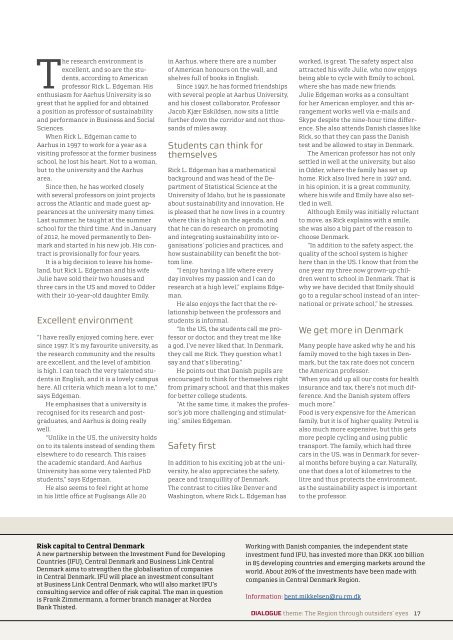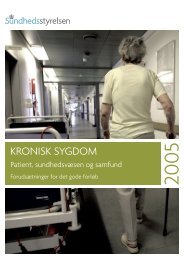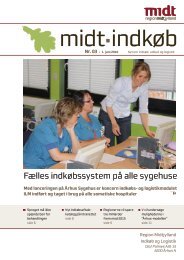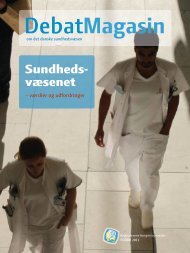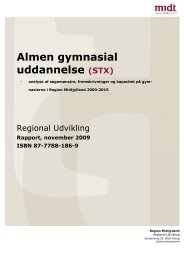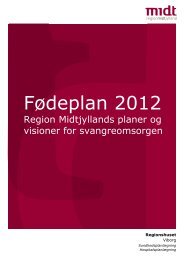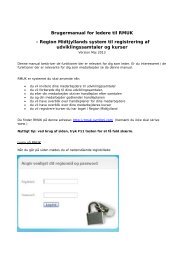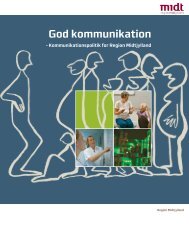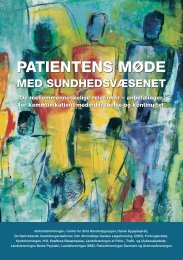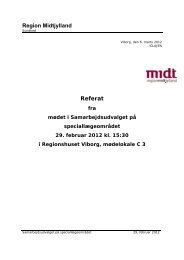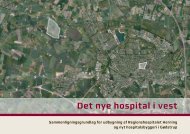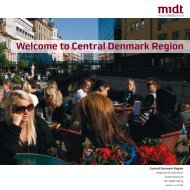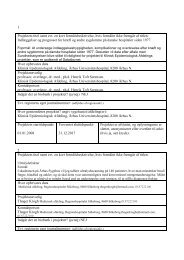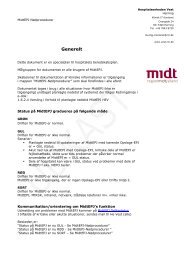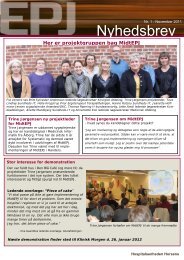OECD commends Central Denmark Region - Region Midtjylland
OECD commends Central Denmark Region - Region Midtjylland
OECD commends Central Denmark Region - Region Midtjylland
Create successful ePaper yourself
Turn your PDF publications into a flip-book with our unique Google optimized e-Paper software.
The research environment isexcellent, and so are the students,according to Americanprofessor Rick L. Edgeman. Hisenthusiasm for Aarhus University is sogreat that he applied for and obtaineda position as professor of sustainabilityand performance in Business and SocialSciences.When Rick L. Edgeman came toAarhus in 1997 to work for a year as avisiting professor at the former businessschool, he lost his heart. Not to a woman,but to the university and the Aarhusarea.Since then, he has worked closelywith several professors on joint projectsacross the Atlantic and made guest appearancesat the university many times.Last summer, he taught at the summerschool for the third time. And in Januaryof 2012, he moved permanently to <strong>Denmark</strong>and started in his new job. His contractis provisionally for four years.It is a big decision to leave his homeland,but Rick L. Edgeman and his wifeJulie have sold their two houses andthree cars in the US and moved to Odderwith their 10-year-old daughter Emily.Excellent environment“I have really enjoyed coming here, eversince 1997. It’s my favourite university, asthe research community and the resultsare excellent, and the level of ambitionis high. I can teach the very talented studentsin English, and it is a lovely campushere. All criteria which mean a lot to me,”says Edgeman.He emphasises that a university isrecognised for its research and postgraduates,and Aarhus is doing reallywell.“Unlike in the US, the university holdson to its talents instead of sending themelsewhere to do research. This raisesthe academic standard. And AarhusUniversity has some very talented PhDstudents,” says Edgeman.He also seems to feel right at homein his little office at Fuglsangs Alle 20in Aarhus, where there are a numberof American honours on the wall, andshelves full of books in English.Since 1997, he has formed friendshipswith several people at Aarhus University,and his closest collaborator, ProfessorJacob Kjær Eskildsen, now sits a littlefurther down the corridor and not thousandsof miles away.Students can think forthemselvesRick L. Edgeman has a mathematicalbackground and was head of the Departmentof Statistical Science at theUniversity of Idaho, but he is passionateabout sustainability and innovation. Heis pleased that he now lives in a countrywhere this is high on the agenda, andthat he can do research on promotingand integrating sustainability into organisations’policies and practices, andhow sustainability can benefit the bottomline.“I enjoy having a life where everyday involves my passion and I can doresearch at a high level,” explains Edgeman.He also enjoys the fact that the relationshipbetween the professors andstudents is informal.“In the US, the students call me professoror doctor, and they treat me likea god. I’ve never liked that. In <strong>Denmark</strong>,they call me Rick. They question what Isay and that’s liberating.”He points out that Danish pupils areencouraged to think for themselves rightfrom primary school, and that this makesfor better college students.“At the same time, it makes the professor’sjob more challenging and stimulating,”smiles Edgeman.Safety firstIn addition to his exciting job at the university,he also appreciates the safety,peace and tranquillity of <strong>Denmark</strong>.The contrast to cities like Denver andWashington, where Rick L. Edgeman hasworked, is great. The safety aspect alsoattracted his wife Julie, who now enjoysbeing able to cycle with Emily to school,where she has made new friends.Julie Edgeman works as a consultantfor her American employer, and this arrangementworks well via e-mails andSkype despite the nine-hour time difference.She also attends Danish classes likeRick, so that they can pass the Danishtest and be allowed to stay in <strong>Denmark</strong>.The American professor has not onlysettled in well at the university, but alsoin Odder, where the family has set uphome. Rick also lived here in 1997 and,in his opinion, it is a great community,where his wife and Emily have also settledin well.Although Emily was initially reluctantto move, as Rick explains with a smile,she was also a big part of the reason tochoose <strong>Denmark</strong>.“In addition to the safety aspect, thequality of the school system is higherhere than in the US. I know that from theone year my three now grown-up childrenwent to school in <strong>Denmark</strong>. That iswhy we have decided that Emily shouldgo to a regular school instead of an internationalor private school,” he stresses.We get more in <strong>Denmark</strong>Many people have asked why he and hisfamily moved to the high taxes in <strong>Denmark</strong>,but the tax rate does not concernthe American professor.“When you add up all our costs for healthinsurance and tax, there’s not much difference.And the Danish system offersmuch more.”Food is very expensive for the Americanfamily, but it is of higher quality. Petrol isalso much more expensive, but this getsmore people cycling and using publictransport. The family, which had threecars in the US, was in <strong>Denmark</strong> for severalmonths before buying a car. Naturally,one that does a lot of kilometres to thelitre and thus protects the environment,as the sustainability aspect is importantto the professor.Risk capital to <strong>Central</strong> <strong>Denmark</strong>A new partnership between the Investment Fund for DevelopingCountries (IFU), <strong>Central</strong> <strong>Denmark</strong> and Business Link <strong>Central</strong><strong>Denmark</strong> aims to strengthen the globalisation of companiesin <strong>Central</strong> <strong>Denmark</strong>. IFU will place an investment consultantat Business Link <strong>Central</strong> <strong>Denmark</strong>, who will also market IFU’sconsulting service and offer of risk capital. The man in questionis Frank Zimmermann, a former branch manager at NordeaBank Thisted.Working with Danish companies, the independent stateinvestment fund IFU, has invested more than DKK 100 billionin 85 developing countries and emerging markets around theworld. About 20% of the investments have been made withcompanies in <strong>Central</strong> <strong>Denmark</strong> <strong>Region</strong>.Information: bent.mikkelsen@ru.rm.dkDIALOGUE theme: The <strong>Region</strong> through outsiders’ eyes 17


